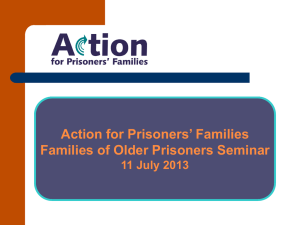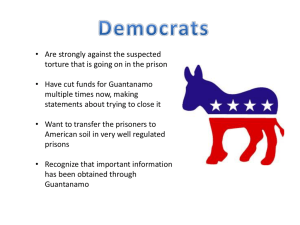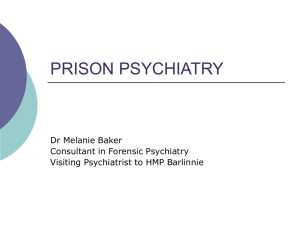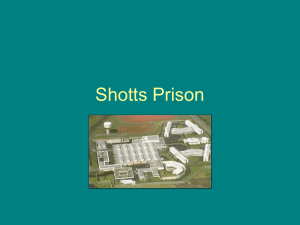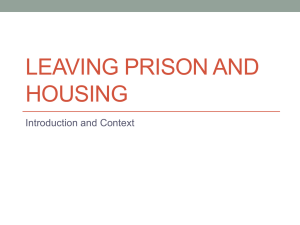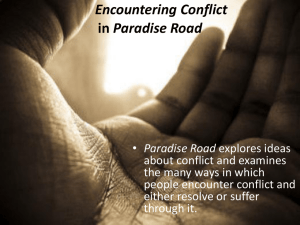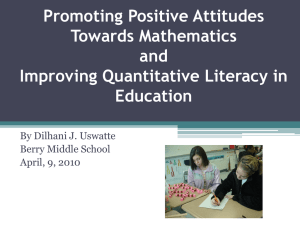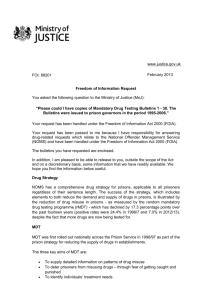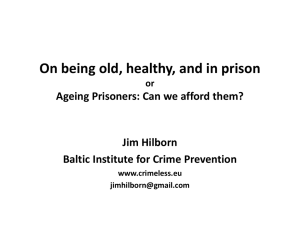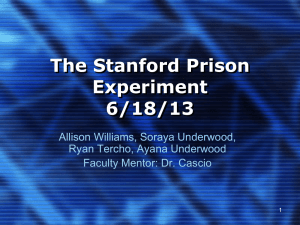Document
advertisement
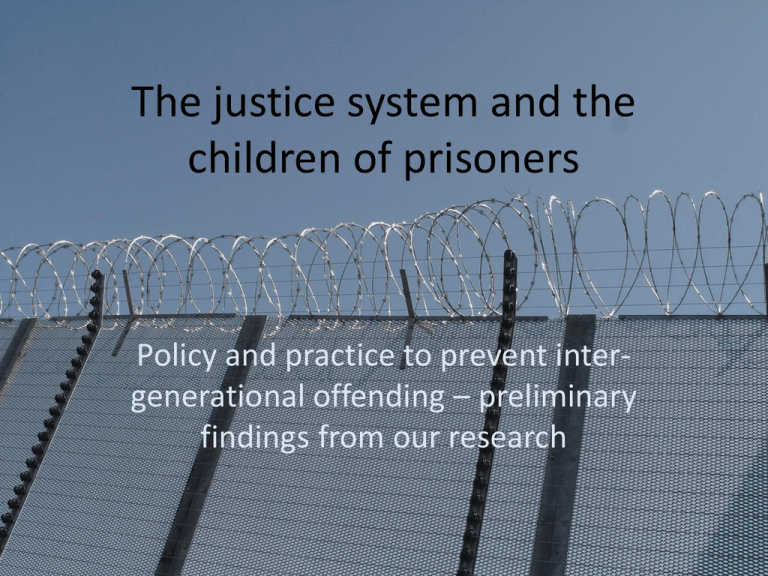
The justice system and the children of prisoners Policy and practice to prevent intergenerational offending – preliminary findings from our research Background It is roughly estimated that 1 per cent of children under 18 experience parental imprisonment each year in England and Wales. It is argued that prisoners and their children are vulnerable to multiple types of social exclusion, including: preexisting deprivation; loss of material and social capital following imprisonment; stigma; ‘linguistic exclusion’; political exclusion; poor future prospects; and administrative invisibility. Despite the apparent prevalence and urgency of the problem, the population of children of prisoners is unmonitored, underresearched and unsupported by the statutory sector. In the UK, failure to support children of prisoners reflects an era of punitive penal policy, and a lack of commitment to reduce social exclusion by the Government. Murray, The Cycle of Punishment, 2007. Pre-existing deprivation The evidence from our study on this was mixed. While most families ended up on a benefit, not all started there. For some, the fall from economic and social stability was extremely difficult, with houses, businesses and cars either having to be sold or being repossessed. There were additional issues for people who had previously been well off, such as fear of people in their community knowing, children being shunned and so on. In one poignant example a teenager had previously told her best friend’s family that her father worked for ‘the government’, as she figured he did, as he tended the gardens at the prison. However, one day….. Pre-existing deprivation Many of the children in our study do come from extremely poor homes, and they bring with them to the imprisonment situation difficulties and deprivation that is nearly always only made worse, not better, by the incarceration of a parent. Aren’t they better off with the violent/ murdering/ dishonest/ abusing/ vicious/ alcoholic/ drug-crazed/ bitter and whatever else the criminal is behind bars? Yet love has no boundaries, does it? A bad person can be a good Dad, can’t he? It is convenient for society to think we are doing these children a favour by removing their parent. Sometimes we are, but our research has found that mostly we are not. These children are left at the bottom of the heap, often angry and feeling betrayed. Loss of material capital The children and families are poor. Most live in households where the main and often only source of income is the benefit or pension – 90% of our families in year one were in that position. Adding to the baseline poverty, some had debts that arose because a family member was in prison (e.g. business failure) and most faced costs associated with prison - money into trust accounts for phones calls etc, travel for the children to see their parent, and so on. A major effect of this poverty is that when the children have problems, there appears to be nowhere for the family to turn for high quality free assistance. Loss of social capital Prison is heavily stigmatised in our society. While in one case we were told that the child had no problems because most of the kids at his school had a parent in prison, most tried to keep the situation quiet. There was a lot of fear that people would find out and the children would suffer. For example in one case, where a man was in prison for sleeping with a 15 year old girl he groomed over the internet, the same-aged daughter was seen as particularly at risk. In another, the family lived in a very socially exclusive rural area, and the mother only told one person in the whole community – the driver of the school bus. Telling teachers… Loss of social capital Māori rates of imprisonment in 2007 were stated to be around 700 per 100,000, which is around the same rate as the ‘mass incarceration’ of the United States. The high Māori imprisonment rate means that the loss of social capital is far less within Māori communities and among Māori. But this is a two-edged sword. When operating in the Pakeha world, the fact of high Māori imprisonment stokes prejudice and discrimination that impacts on life opportunities. At our Christchurch launch last year, one person spoke about a kaumatua who criticised penal policy by stating “they are building new prisons for tamariki who are not yet born”. Stigma Prisoners are stigmatised in our society as scumbags, losers, druggies, bad parents, people who should be sterilised, should live in tents on the Desert Road and so on. The dominant discourse is of punishment and retribution, not of rehabilitation and integration. This spills over onto the children, causing health and educational problems, bullying, anti-social behaviour and thus leading directly to the potential for intergenerational offending. We were asked last year by officials whether there was any difference between these children and other children living in poverty. The answer is yes. The burden of stigma is a huge one to carry. Political exclusion Until the release of our first year findings last year, the public policy discussion around the children of prisoners was almost entirely limited to the issue of babies in prison with mothers. There has been widespread interest in our findings, with this the second seminar to policy agencies (first health). Research released into a punitive and noxious environment where the ‘rights’ of ‘victims’ trump all other discourses. In order to take steps to prevent the children of prisoners populating the prisons in a generation, the situation and needs of the families and children of prisoners need to be brought to the centre of policy. There is a need to challenge weakness in the current approach, in particular to point out that it is within the capacity and capability of a variety of state agencies to introduce policies to prevent these children ending up in prison. Disenfranchisement of prisoners and their families. Poor future prospects Two thirds of Māori and one third of pakeha prisoners we interviewed last year had, as a child, seen between one and eight family members go to prison. According to NZ research, prisons are full of people with poor educational outcomes and emotional and mental illnesses. The families and children we interviewed spoke of a wide range of physical, emotional and emerging mental health problems in the children, and a variety of factors that prevented the children learning and doing well at school. Most live in poverty, which is itself a huge risk factor. We have a bunch of emotionally upset, ill, under-educated, stigmatised children who are about to become adults, with virtually no services in place to defuse the time bomb that many of them represent. In conclusion The report can be found at www.networkers.co.nz or www.pillars.org.nz We have now completed the second and final year of the study (unless funding can be found for year 3). Our research shows that changing policies and practices in health, education, social services, income support and the agencies of justice could together eliminate the factors that cause the children of prisoners to become prisoners in the next generation. How then can we change the dominant discourses around policy so that politicians and the public embrace this as the best route to a crime free society?

